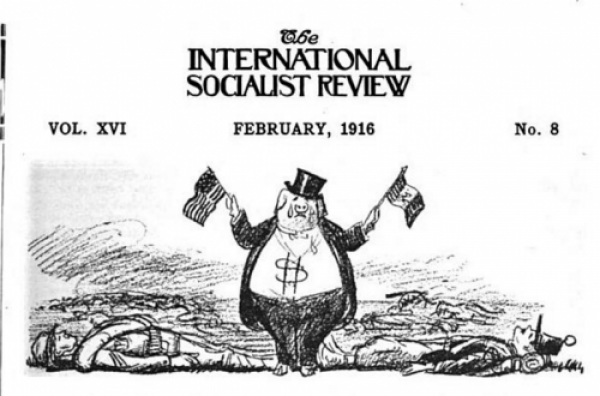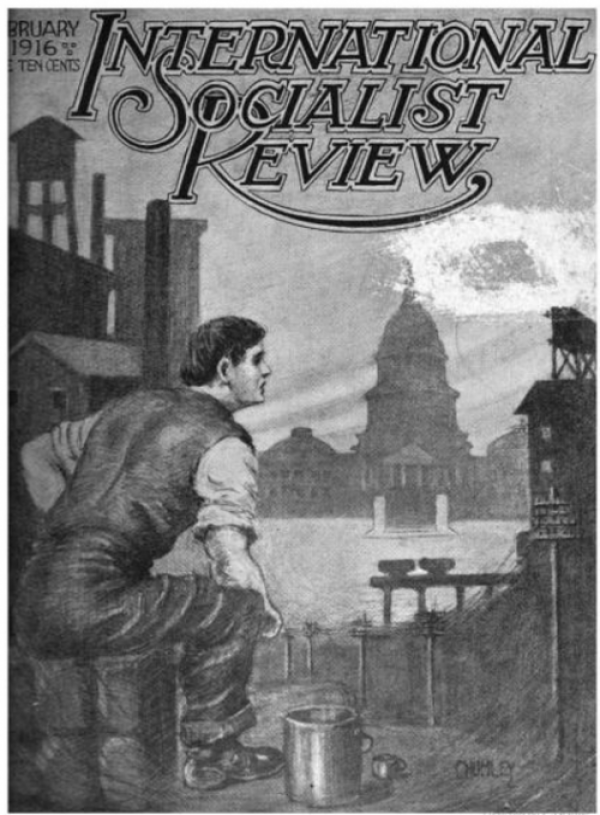Hellraisers Journal: "This is not a war of Freedom." It is a war for "rulership of the earth.."
The armies and navies which our strutting militarists plan to create here
are not intended for your defense and mine.
Their purpose..is to protect their commerce abroad and rob the workers here
of the last remaining vestiges of their rights under
the constitution and the laws.
-Frank Bohn
~~~~~~~~~~~~~~~~~~~~~~~~~~~~~~~~~~~~~~~~~~~~~~~~~~~~~~~~~~~~~~~~~~~~~~~~~~~
Monday February 14, 1916
From the International Socialist Review: Frank Bohn on Preparedness
In the February edition of the Review, Comrade Bohn offered some thoughts on the issue of preparedness:
PREPAREDNESS
A Speech Delivered at Carnegie Hall, New York, Jan. 5th, 1916
By FRANK BOHN
-----
Ibsen has somewhere told us that if peace is ever to fully prevail among nations it will be due to the combined efforts of the working class and of womankind. This very natural alliance of the forces of international peace results from a fundamental. The two great elements of social progress are drawn together by the peculiar fact that both are producers. Women produce people and the working class produces things of value. The reason why women as a sex are in the future going to unite their efforts with the labor movement is set forth again and again by August Bebel, the foremost political representative of labor in the nineteenth century, in the most important book ever written on the subject of women. Hence, tonight, I take very great pleasure in representing, as your chairman, the two organizations through whose joint efforts this meeting has been arranged, The Labor Forum and The Woman's Peace Party.
Preparedness Defined.The advocates of militarism and war have given a peculiar meaning to the word preparedness. Mr. Roosevelt has said, point blank, that our needs require a navy of forty-eight battleships and battle cruisers and vessels of all other classes in proportion. The regular army, in his opinion, should consist of 245,000 actives and a reserve of two millions. The real meaning of this cannot possibly be misinterpreted. Our militarists intend to prepare America for war, as Germany, Austria, Russia and France were prepared for war on the eve of the great conflict.
The Argument for Preparedness.The argument of the militarists rests upon two pillars. The first of these consists of an analysis of the wars in which the United States has been engaged during the past hundred and forty years. The second is incidental to the great conflict now raging in Europe. We are to be attacked by the victorious powers and must hasten to prepare our defenses.
Very recently I heard Mr. Wood, late a member of the Naval Advisory Board, go over with great care what he supposed to be facts of American history. These impressions of Mr. Wood's have caused him to resign his position on the basis that Mr. Wilson's paltry army of 533,000 men, and his corresponding recommendations for the navy, are insufficient to defend our liberties.
Philosophical interpreters of American history, like Mr. Wood and Mr. Roosevelt, begin with the Revolutionary war. They say that if we had had an army in 1775 the war would very soon have been at an end and the nation's independence established. Let us look more closely into this matter. Preceding the Revolutionary war the enemies of the Colonists were the Western Indians and the French population in Canada. For a hundred and fifty years the advocates of Preparedness among the colonists had never ceased to clamor for British troops to defend them. True, both the Indians and the French were few in number compared to the English colonists, but the advocates of Preparedness in that day were always arguing that without tens of thousands of British troops the English frontier settlements would always be in danger from the scalping knife in the West and French invasion from the North. In response to this cry of the Preparedness cowards in that day, the British Government placed ten thousand soldiers on the American continent. These were the troops whom the Americans had presently to shoot at Lexington and Bunker Hill. Preparedness turned out to be preparedness for oppression only.
The independence of America resulted from the fact that Great Britain was unprepared for war. The men of England refused to volunteer to make war on the English here. Had conscription been introduced in England or had the militarists of England had their way before the war, England might have had in 1775, fifty thousand regulars instead of eighteen thousand. Two hundred and fifty years of history in England and America attest the fact that political freedom is not protected, but destroyed by military power.
The War of 1812.Let us listen for a moment to Chapter Two of American history as set forth by Mr. Wood:
If, at the beginning of the War of 1812, we had had a larger standing army, we might have speedily conquered Canada, annexed her to the United States and ended the war.
That is, if we had had twenty-five thousand regulars instead of five thousand, we might have done to the inoffensive and peaceful people of Canada what Germany has done to Belgium! A majority of the English-speaking people of Canada at that time was composed of The United Empire Loyalists who fled to New Brunswick and Ontario for the purpose of remaining within the British Empire. Too bad our regulars were not numerous enough to pursue them to the poor shelters they had built in the forest, and ram the Stars and Stripes clown their throats with bayonets. I wonder if our advocates of Preparedness are willing to go tonight and repeat this part of their speech in Montreal, Toronto or Ottawa.
Chapter Three deals, of course, with the Mexican war. I have noted that the advocates of Preparedness do not much emphasize this part of their argument. In the Mexican war the slave power of the South, using the United States army and navy, made conquest of a huge section of Mexican territory for the purpose of getting slave states to balance and offset the free states in the North. At the head of the troops that invaded Mexico there should have been carried a flag bearing the picture of a black slave tied to a tree in South Carolina and being whipped by a New England overseer. Too bad we didn't have a hundred thousand regulars at the beginning of the Mexican war instead of ten thousand! We might then have held the whole of Mexico for chattel slavery, formed a dozen more slave states and prevented the election of Lincoln in 1860.
The Civil War.Here the Militarist comes to the crux of his argument. At the beginning of the Civil war our regular army numbered 14,000 men. "If it had but numbered fifty thousand we might have won the battle of Bull Run and ended the war." Like the preceding arguments this sounds exactly like the militarists. It is the blank cartridge of the tin soldier of historical scholarship. At the beginning of the Civil war, every officer of the regular army who was fit to command an army, an army corps, or a division, during the first year of fighting, resigned and cast in his lot with the South. In the North our West Pointers were drawn by the high salaries and profits of industrial development into commercial life. In the South, the army, the navy, the bar and the church, were the only professional diversions for the sons of respectability. The Army of Northern Virginia was commanded by Joseph E. Johnston and Robert E. Lee. The Army of the Potomac fell into the hands of McClellan, the railway financier, of Hooker, the western gentleman rancher and of others of a like stamp.
HAD THE ARMY OF THE UNITED STATES AT THE BEGINNING OF THE CIVIL WAR BEEN FOUR TIMES AS GREAT AS IT WAS, THERE WOULD HAVE BEEN FOUR TIMES AS MANY MAJOR GENERALS, BRIGADIER GENERALS AND COLONELS HANDED OVER TO THE SOUTHERN, CONFEDERACY TO ORGANIZE AND COMMAND THE ARMIES OF DISUNION.
Furthermore, by far the greater proportion of the reserve supplies of small arms, to be accurate, one hundred and fifteen thousand muskets with proportionate amounts of other arms and munitions were, on the eve of the war, shipped South by the Southern Secretary of War in the Government at Washington. Had the army been four times as great as it was that Secretary would have turned over four hundred and sixty thousand Springfield muskets to the Confederacy and so many holes would have been shot through the Stars and Stripes that Lincoln and all the men of the North could never have patched it up again.
I shall not waste your time by discussing at length the Spanish-American war and the Philippine Rebellion. Cuba was won for the Sugar Trust by the yellow press of the United States without the assistance of the army. Even the loudest and most rattle-brained advocate of Preparedness who gets into print publicly, forbears to mention the conquest of the Philippines. The order given by one general to his troops to make a certain island a "howling wilderness" by "killing everybody over ten years of age," the "water-cure," the shiploads of insane and syphilitic young soldiers returned to the United States and never properly reported to the public—these make ourselves as well as our opponents anxious to forget this unholiest chapter of all in the military history of the nation.
The World War and the Workers.Leaving the subject of the working-class in its relation to militarism and international wars to the other speakers of the evening, I wish to conclude by saying a word as regards the attitude of the governments now at war toward the working class of Europe. From it we may draw conclusions as regards the workers of America. Years ago, in Ohio, I numbered among my friends an old German, who, as a soldier of fortune, had fought in almost every important war of fifty years. He had been a volunteer with the allies in the Crimea. He enlisted under the banner of Francis Joseph in the campaigns of spoliation in Northern Italy. He came to the United States in 1863 and commanded a troop of cavalry under Sheridan. He took service with Maximilian in Mexico. Finally, in his old age, he tried to go with a regiment in which I was serving in the Spanish-American war, but was rejected on account of age. "What were you fighting for in all those wars?" I once asked him. "I was fighting for freedom, always," he replied. Freedom—that's what every nation in Europe is shouting through it official mouthpieces. When the Germans pay the salaries of Mohammedan priests to preach the Holy War of the Prophet to their Turkish allies, the Germans declare they are but paying the price of freedom from jealous enemies. When Great Britain pays salaries to the same brand of sky-pilots to preach among the Mohammedans of a broken and oppressed India the doctrine that every dead German places them a step nearer celestial life, is not Britain also merely paying the bills incurred by the Goddess of Liberty in Flanders and Gallipoli.
Poor Freedom! On the day the war broke out, every monarch and every minister among the warring nations expected revolution to break out—in the other fellow's capital. Germany expected the Czar to be dynamited in St. Petersburg and the Commune to be declared in Paris. Not a British capitalist but, who, having seen, with fear and trembling, the inroads of the German commercial agent, expected the Socialists of Germany to make a seven days' task of his job of smiting a business rival hip and thigh.
Let me emphasize here that we Socialists have not forgotten the bloody death of the Paris Commune in 1871. While the soldiers of the Republic of France murdered 35,000 workers in cold blood, the hosts of Moltke and Bismarck stood by enjoying the spectacle. Today if a revolution in Russia should dethrone the Czar, the legions of Von Hindenburg would march in, kill every rebel in sight and place the Czar back on his throne. Let us come to judgment with regard to such facts as history has given us to consider. When the Indian contingent was ordered to Europe, a native regiment in the Straits Settlements refused to move. There being no white English soldiers near by to pump lead into them, marines were brought from a Japanese warship which was, happily for the British commander, passing through. Now, if Great Britain is willing to use Japanese marines to kill her own rioting soldiers, do you suppose that she would hesitate to use Hindoos or blacks or whites against rebellious German Socialists? Not at all. Were a revolution of the working' people possible in Germany, that revolution would be stamped out by the soldiers of England, of France, of Italy and of the Czar. And do you, American workers, and American women, surmise for moment that if the First Regiment of Colorado Infantry, which smothered and burned up alive the women and children of Ludlow and threw oil on the dead bodies in order that, done to ashes, they might not be discovered—do you suppose that the First Colorado Infantry Regiment, or any other American regiment, if sent against Germany to avenge the drowning on the sinking Lusitania of that distinguished representative of American culture, Alfred Vanderbilt, would refuse to obey an order to break the back of a worker's revolt in Germany?
This is not in any sense a war of Freedom. It is a competitive war of your masters for the rulership of the earth and you. The armies and navies which our strutting militarists plan to create here are not intended for your defense and mine. Their purpose, often stated openly as well as indirectly, is to protect their commerce abroad and rob the workers here of the last remaining vestiges of their rights under the constitution and the laws. For the protection of what rights we have, for the advancement of our interests as a class, we, who hold no property, require no cannon, no submarines, no warplanes and no gold lace. Our sole need is education in our class interests, political and industrial organization, and the springing up in all our hearts of a holy enthusiasm for freedom and peace and international brotherhood.
On the cover of the February Review was the artwork of L. Standford Chumley:
SOURCE
The International Socialist Review, Volume 16
-ed by Algie Martin Simons, Charles H. Kerr
Charles H. Kerr & Company,
July 1915-June 1916
https://books.google.com/books?id=9VJIAAAAYAAJ
ISR, Feb 1916
https://books.google.com/books/reader?id=9VJIAAAAYAAJ&printsec=frontcove...
Preparedness by Frank Bohn
https://books.google.com/books/reader?id=9VJIAAAAYAAJ&printsec=frontcove...
IMAGES
International Socialist Review, Feb, 1916, Preparedness, Frank Bohn
https://books.google.com/books/reader?id=9VJIAAAAYAAJ&printsec=frontcove...
Frank Bohn, ISR, Feb 1916
https://books.google.com/books/reader?id=9VJIAAAAYAAJ&printsec=frontcove...
International Socialist Review, Cover by Chumley, Feb 1916
https://books.google.com/books/reader?id=9VJIAAAAYAAJ&printsec=frontcove...
See also:
Frank Bohn
https://en.wikipedia.org/wiki/Frank_Bohn_(socialist)
L. Stanford Chumley
https://books.google.com/books?id=n2ATBwAAQBAJ&pg=PA427&lpg=PA427&dq=%22...
````````````````````````````````````````````````````````````````````````````````````````````````
The Internationale ( In French )
Lyrics by Eugène Pottier - Paris, June 1871
The song of the First and Second International, it was written by a transport worker after the Paris Commune was crushed by the French government.
https://www.marxists.org/history/ussr/sounds/lyrics/international.htm




